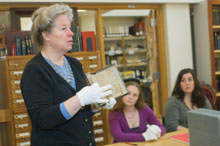
The Wheaton College Digital History Project employs a collaborative model of research and publication that differs profoundly from the classic image of the lone researcher in the physical space of the archive. As we use digital technologies to teach our students and to publish documents, we contribute to historical scholarship by vastly increasing access to documents that have previously been available only to those who could be in the same physical space with either the original document or its edited version in book form. Indeed, the Wheaton Family Papers constitute a hidden collection whose significance in the history of women’s education in the United States has gone largely unnoticed until now.
Since fall 2004, students in U.S. History courses have been transcribing and marking up nineteenth-century documents from the Marion B. Gebbie Archives and Special Collections in the Wallace Library at Wheaton College for digital publication. The opportunity to begin such work arose when Wheaton collaborated with Mount Holyoke College to host a two-part conference that explored uses of the Text Encoding Initiative (TEI) in teaching and research at liberal arts colleges.
